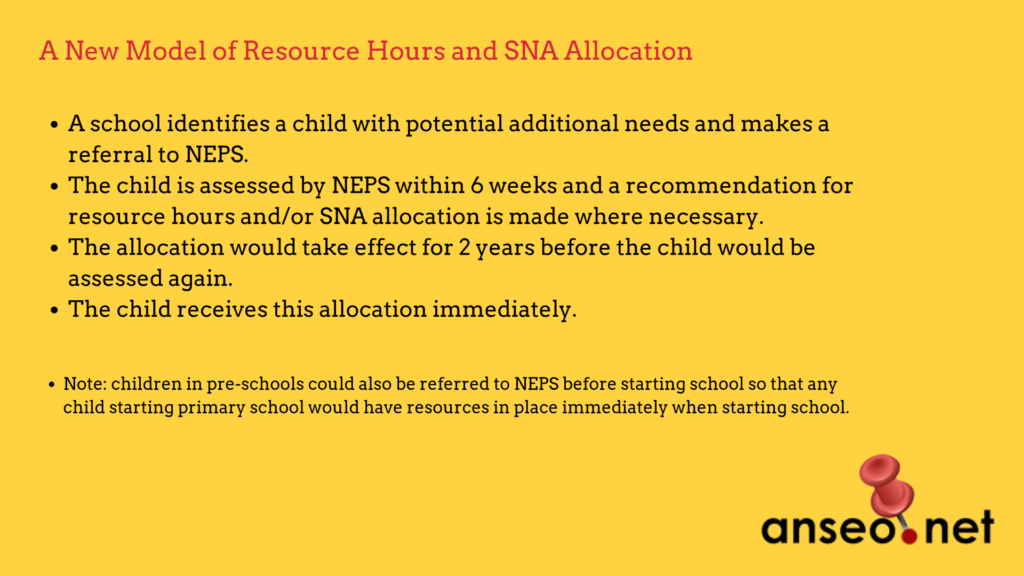When one looks at the number of agencies involved in education, one has to ask why there are so many and what do they actually do. The NCSE is the National Council for Special Education. Back when they started in 2003, there was very little work done in the area of special needs in education. It had a range of functions which were very necessary, and over the years, it was able to establish lots of research and lots of systems for allocating schools with resource hours and additional staff, in the form of SNAs.
Back in the day, if I needed an SNA, I would make a call to my local NCSE officer (the SENO) and he or she would come to my school and allocate an SNA for a child that might require it. My resource hours were calculated on the number of children in my school who had particular needs – 5 hours per week for autism, and so on.
Then the recession came. Then the cuts. Then the bureaucracy.
What we now have is an organisation that is no longer needed. It has basically become a place where paper is pushed around. Children with additional and complex needs now beginning primary school are unlikely to get additional support for several months because so much red tape has been put in the way.
Let’s just take an arbitrary example of a typical scenario a school might find themselves in now.
A school has an enrolment of a child with behavioural difficulties. It is clear that the child requires the support of an SNA. It’s so clear that spending 30 seconds in the classroom would lead you to this conclusion.
However, in order to get an SNA for this child, a teacher will have to follow the Continuum of Support with a Classroom Support Plan. This might take up to 6 weeks, bringing this child to mid-October. Given that mainstream class teachers are generally pretty good at dealing with ordinary poor behaviours, a child with more severe behaviours would obviously fail here and then they would have to move to a School Support Plan. (The likelihood is that this would happen by early October) and some support would be given to this child. Again this may fail and often will when the behaviours are so severe. The next stage one would think would be to apply to the SENO for extra support. However, before one does that, we need the following:
- The child needs a behavioural-related diagnosis. If they don’t, one can forget about continuing.
- On top of. this, they need to be under the care of a psychologist for this behaviour. This must be put in writing by a psychologist.
- We also need to fill in a form called a BCN1 form which takes several hours to fill out
- We also need to fill in a regular application for an SNA, which also takes time
- We then have to ensure that every other child with SNA access is fully reviewed to ensure that the school hasn’t somehow missed that they have extra capacity, so that means we have to prepare full files on all of the children in the school with SNA access.
It can take a number of weeks to compile all of. this information, especially in a big school. This stuff is then packed into a box and sent to the SENO who has to spend days reading through loads of paperwork and finding anything that might not tick a box.
The SENO then visits the school and tries to find further capacity within the staff and then makes a decision, which is passed on. to the Department of Education.
Finally the Department of Education either sanction or. don’t sanction the recommendation from the SENO.
Meanwhile Santa has been and gone, and the child has likely regressed further.
The thing is, none of this is really necessary. If we simply looked at the psychological report in the case above in the first place, it is. very likely that a recommendation for an SNA would have been made. This should surely be good enough.
But, ha! You might say, isn’t that open to abuse? What about the private psychologist that will simply give everyone that comes to them an SNA.
Here’s the plan.
Scrap the NCSE and replace it with a much enlarged NEPS service. This service would negate any need for any private assessments and it would be independent. Any child could be referred and they would be seen within 4-6 weeks. The NEPS psychologist would diagnose a child where necessary and outline a number of resource hours per week required for the child and how much of an SNA allocation he/she would need. The recommendation would last for 2 years and then the child would be reassessed and the hours readjusted. These figures would be sent to the DES directly and schools would be allocated their resources based on the personal recommendation of a qualified psychologist. There would be no need anyone else to do anything. Children in pre-schools could also avail of the service. The service would be free.

Scrapping the NCSE or changing its purpose to a more research-based facility or amalgamating it with something else is probably the best move. Unfortunately, it has managed to make itself redundant by focusing on bureaucracy instead of children and now when you remove the bureaucracy, there’s actually very little they do.


